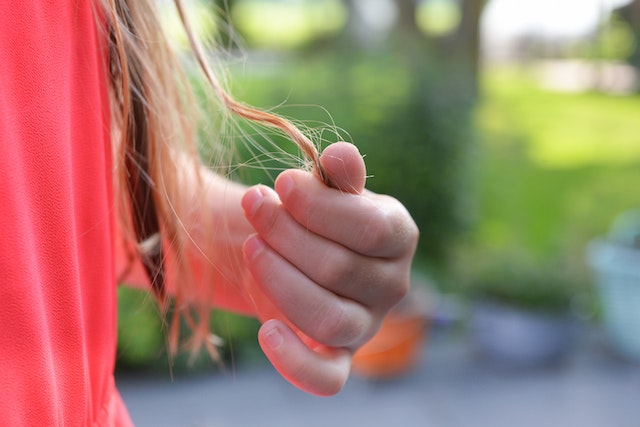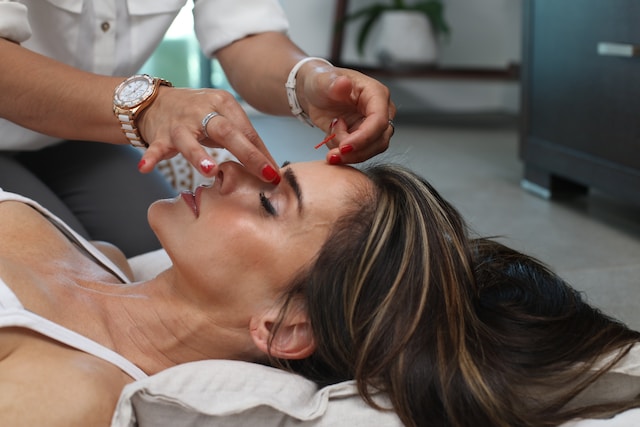

Many people are self-conscious about hair loss. Chronic stress is often ignored, even though genetics and ageing are the most common causes. Stress can be a major factor in hair loss.
The conventional treatment for hair loss is often medication and topical treatments. However, new research indicates that there’s a powerful link between mind and body. This link indicates the potential for mindfulness, which is a state of open, active attention in the present moment, to combat stress-induced loss of hair.
Understanding Stress-Induced hair loss
Hair follows a specific growth cycle that includes the anagen phase (growth), catagen phase (transition), telogen phase (resting). Stress, whether chronic or severe, can disrupt this cycle and cause more hairs to enter the telogen stage prematurely. Telogen effluvium is the name of this condition, which leads to hair loss.
Stress can also worsen conditions such as alopecia, an autoimmune disease that affects hair follicles. And trichotillomania is a psychological disorder where people feel compelled by their own hair to pull it out. Stress management is important for our overall health, but also to maintain a healthy hairstyle.
The Power Of Mindfulness
The practice of mindfulness, which has its roots in ancient meditation techniques, is now a part of contemporary psychology. The practice involves keeping one’s attention on the moment, while accepting and recognizing feelings, thoughts and bodily sensations calmly. Researchers have shown that mindfulness can reduce stress, which could be a tool to manage stress-induced hair thinning.
Mindfulness Techniques for Stress Management
A number of mindfulness techniques may help to reduce stress and improve hair health. Each technique is a way to bring you back to the moment, away from worries about the past and the uncertainty of the future.
1. Mindful Breathing
The core of mindfulness is conscious breathing. This technique involves focusing your attention on your breathing, observing every inhalation and each exhalation without judgement. If your mind wanders – and it will – gently bring it back to the breath. By focusing on your breath, you can create a feeling of calmness and presence. This will reduce stress and promote mental clarity.
2. Body Scan Meditation
Body scan meditation helps to foster a stronger mind-body relationship. This involves scanning your entire body mentally from head-to-toe and noting any tensions or discomfort. This increased awareness helps identify physical stress and promotes relaxation.
3. Mindful Eating
We often eat quickly in an age of distractions and don’t fully appreciate the food that we eat. In order to practice mindful eating, you must savor each bite and pay attention to its texture, flavor, and smell. This practice promotes a better relationship with food. It is important for hair health, as nutrition plays an important role in hair quality and growth.
4. Mindfulness-Based stress Reduction (MBSR).
MBSR is a structured, mindfulness-based program that combines yoga and meditation. This program was developed at the University of Massachusetts Medical School and has been extensively studied and proven to reduce stress and anxiety. This eight-week program provides a structured way to cultivate mindfulness and reduce stress-related hair losses.
5. Meditation on Loving Kindness
Metta, or loving-kindness, meditation involves developing feelings of warmth, goodwill and kindness towards yourself and others. This practice can be beneficial.
It can help reduce stress and anxiety as it fosters a sense compassion, understanding and interconnectedness to those around us.
Incorporate Mindfulness into Your Routine
It can be difficult to establish a mindfulness practice, especially if it’s your first time. It’s easier than you think. Begin with 5 to 10 minute sessions per day and gradually increase the duration of the practice as you get more comfortable.
Over time, mindfulness will become as natural to you as brushing your teeth. You might find yourself doing mini-mindfulness sessions all day long, taking a few moments to concentrate on your breathing or feel the sensations of your body.
Consider incorporating other healthy habits, such as regular physical activity, a balanced eating plan, and enough sleep, into your daily life. These habits work together to promote well-being and reduce stress.
Do not hesitate to contact a professional if you notice that your hair is falling out or if you feel stressed. Stress-induced hair loss is temporary. As stress levels drop, your hair cycle should return back to normal. Click here for more information on how long hair takes to grow.
The Use of Mindfulness in Hair Care
Stress-induced hair fall may seem inevitable in today’s fast-paced society, but we have a way to combat it: mindfulness. Mindfulness, with its stress-reduction benefits, could be an effective, natural and non-invasive way to manage hair loss.
Mindfulness techniques can improve hair health and contribute to overall mental and physical wellbeing. Accept mindfulness as your way of living – it’s a journey to self-discovery and acceptance that will help you reduce stress. It can also improve the overall health of your hair.
The journey of a 1000 miles begins with one step. Start today by taking the first step to mindfulness and reaping its benefits for both your hair and overall health.






